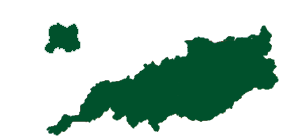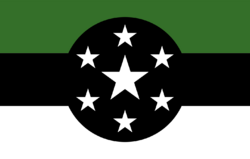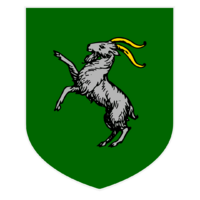Swinas
Federal Republic of Swinas Uet Republjiče Puïdeera ot Sviinasva | |
|---|---|
| Motto: Apa pižatipše petuatet. One can defeat all. | |
| Anthem: "God Protect Tuasvelat" | |
 | |
| Capital | Tuasvelat |
| National Language | Sviina, Common, German |
| Ethnic groups |
|
| Demonym(s) | Sviina |
| Government | Dual-Presidential Federal Republic |
• Apa Païtnasva (First President) | Jako Tetalad |
• Kub Païtnasva (Second President) | Ljorane Riči |
| Area | |
• Total | 985,095 km2 (380,347 sq mi) |
| Population | |
• 2020 census | 42,299,153 |
| GDP (nominal) | estimate |
• Total | 448,984,350,000 |
| Currency | Sviina Dollar (SD) |
| Driving side | right |
| Calling code | +59 |
The Federal Republic of Swinas is a Dual-Presidential Federal Republic led by the First and Second President, provincial leaders, and a unicameral Senate. The Federal Government is hosted in the Capital City of Tuasvelat, and a majority of the population of Swinas speaks their native tounge, Sviina. Additionally, the island of Nordinsel speaks German, and more recently, many common speakers have begun to appear in Sviinas, though Sviina continues to be the majority. Known to the native speakers of Sviinas as "Uet Republjiče Puïdeera ot Sviinasva", it covers a considerable area of 985,095 square kilometers (380,347 square miles). Banks in Sviinas use the Sviina dollar, and cars drive on the right.
History
Government
The Government of Swinas will now be explained in full depth. The Government of Swinas is divided into 3 echelons, the first being the Consuls, the next being the Senate, and finally the Provinces. The consuls are the easiest to explain, and will be discussed first. The requirements to become a consul are that you must be at least 30 years old, you must have been a member of the senate for 5 years, and you must be born in Swinas or your parents were born in Swinas. The two consuls share the power to veto and approve legislation, but if the Senate counters the veto with a 75% majority then it is passed regardless. The two consuls must both sign legislation before it is passed. Then there is the Senate. The Modern Senate is comprised of 100 members, but this number has changed throughout history. To be a member of the Senate you must be 20 years old. A senator has one vote each, and a simple majority of 51/100 can pass a law. If both consuls veto a law, then it can be countered by a 75/100 majority, which will override the Consul Veto and force the law to be passed. The Senate has some limitations per what laws it can pass due to the constitution, mainly that it cannot impede upon the established Bill of Laws. Laws in the Bill from the beginning of the Federal Republic cannot be easily removed, but newer ones are easier to remove.
Lastly there is the provinces. Each province has a governor who can choose to follow or not follow certain legislation passed by the Senate. In addition, the Governor acts as the speaker of the Province, as there is also a Provincial Assembly in every province which has a member count proportional to it's population. These provincial assemblies can only pass laws which involve the province they are in, however. The consuls, senate, and provinces altogether make up the Modern Government of Swinas, which has been in place for 400 years and is still stable today.

